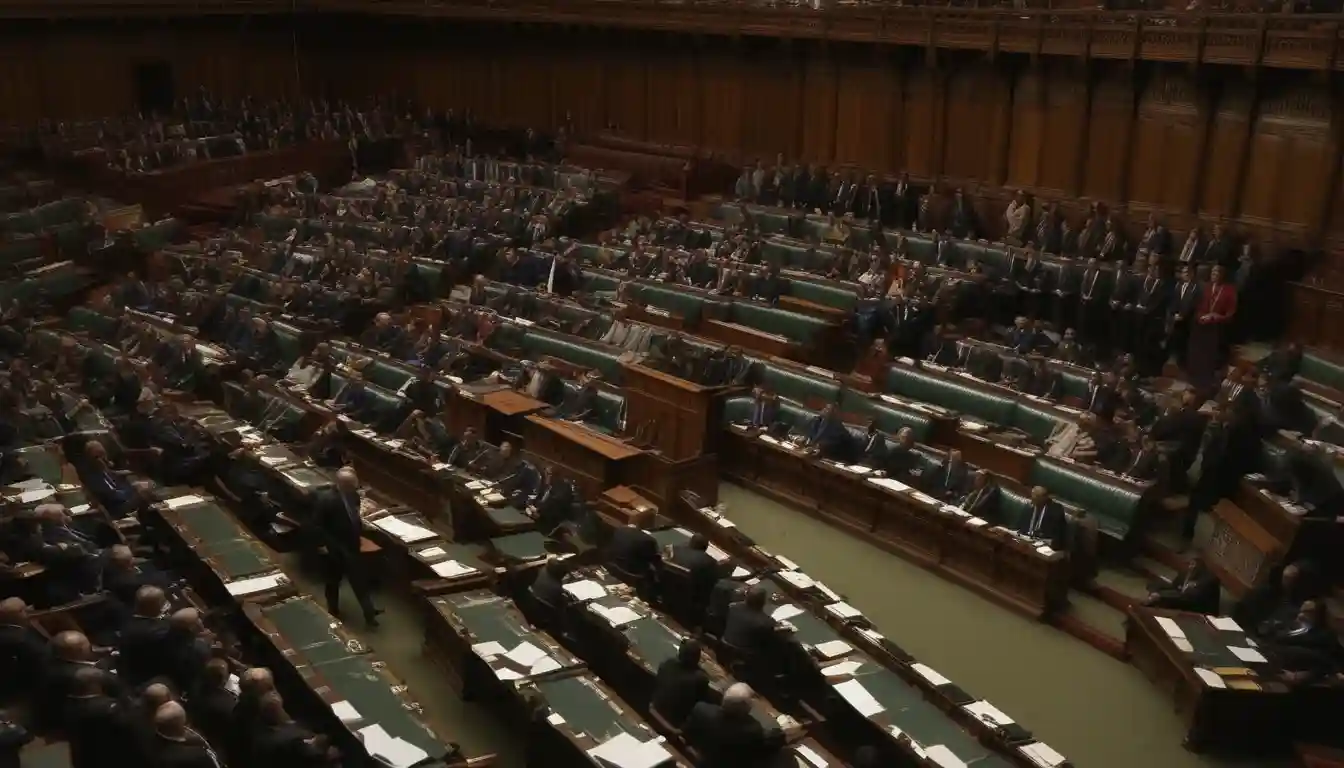
France Loses Second Prime Minister in a Year as Parliament Rejects Austerity Budget
France's Political Reckoning: When Fiscal Reality Collides with Democratic Arithmetic
PARIS — The marble halls of the Palais Bourbon witnessed a moment of brutal arithmetic on Monday afternoon. As lawmakers delivered their verdict—364 votes against, 194 in favor—Prime Minister François Bayrou's political gamble crumbled into constitutional dust, marking the second government collapse in less than a year and exposing the profound structural tensions now defining French democracy.

The collapse was not unexpected, yet its implications ripple far beyond the ornate chambers of the National Assembly. In toppling Bayrou's minority government, French lawmakers have crystallized a new political reality: a nation caught between fiscal necessity and democratic fragmentation, where traditional governance has given way to what one senior analyst described as "perpetual minority rule by negotiation."
This is not the story of a failing state, but of a democracy discovering its new equilibrium—one that may permanently alter how Europe's second-largest economy manages both its public finances and its place within the European Union's fiscal architecture.
The Arithmetic of Impossibility
Bayrou's fatal miscalculation was deceptively simple. Facing a deficit running at nearly double the European Union's 3% ceiling and national debt approaching 114% of GDP, he tied his government's survival to a €44 billion deficit-reduction package that included symbolically toxic measures like scrapping public holidays. The strategy unified opponents across ideological lines with surgical precision.
France’s latest deficit and debt vs EU references
| Metric | France | EU reference | Gap vs EU target | Notes |
|---|---|---|---|---|
| Deficit (% of GDP) | 5.8% (2024); ~5.4% (2025 proj.) | 3.0% | +2.8 pp (2024); +2.4 pp (2025) | Deficit still well above ceiling despite planned consolidation. |
| Debt (% of GDP) | ~113–114% (end-2024 / early 2025) | 60% | +53–54 pp | Debt ratio high; slight further rise likely without stronger adjustment. |
| SGP context | Reformed SGP retains 3% / 60% thresholds | — | — | New rules impose stricter, country-specific debt paths. |
| Euro area backdrop | EA debt ~87–88% (2025 est.) | — | — | Aggregates mask heterogeneity; post-reform surveillance tightened. |
"The mathematics were always against him," observed a veteran parliamentary analyst who requested anonymity. "In a hung parliament, turning fiscal policy into a confidence vote is political malpractice."
The defeat reflects deeper arithmetic: France's fragmented Assembly, splintered by President Emmanuel Macron's miscalculated snap elections in 2024, makes stable governance nearly impossible. The numbers tell the story—no single bloc commands a majority, yet cross-ideological coalitions against any government can easily exceed the 289-vote threshold needed for a no-confidence motion.
A motion of no-confidence in France allows the National Assembly to challenge the government, potentially forcing its resignation if passed by an absolute majority. It can be initiated by deputies or, notably, automatically triggered when the government uses Article 49.3 of the constitution to pass a bill without a parliamentary vote.
This structural deadlock has transformed French politics from consensus-building to perpetual crisis management, with each prime minister inheriting the same impossible equation: how to govern without a governing majority.
Beyond Political Theater: The Fiscal Pressure Cooker
Beneath the constitutional drama lies a more fundamental tension. France's fiscal position, while concerning, is far from catastrophic by historical standards. Yet the combination of elevated debt levels, rising funding costs, and European Union pressure creates a political pressure cooker where even modest consolidation attempts become lightning rods.
The spread between French and German 10-year government bond yields, a key indicator of market-perceived risk.
| Date | France 10-Year Bond Yield (%) | Germany 10-Year Bond Yield (%) | Spread (bps) |
|---|---|---|---|
| September 8, 2025 | 3.41 | 2.65 | 76 |
| September 7, 2025 | 3.453 | 2.667 | 78.6 |
| August 31, 2025 | 3.50 | 2.70 | 80 |
The €44 billion adjustment Bayrou proposed represented roughly 1.6% of GDP—significant but hardly unprecedented in European fiscal history. What made it politically toxic was its framing and timing. Coming after years of reform fatigue and rising living costs, the package's emphasis on symbolic cuts rather than systemic reform mobilized opposition from both populist right and socialist left.
Market participants have largely looked through the political noise, with French government bond spreads remaining within manageable ranges. The underlying economy continues to function, and France's fundamental creditworthiness—while strained—remains intact.
"This isn't about solvency risk," noted a senior fixed-income strategist at a major European bank. "It's about execution risk and the persistent uncertainty premium that comes with serial political instability."
The New Rules of the Game
What emerges from this latest collapse is a clearer picture of how France must now govern. The old Fifth Republic model of strong executive leadership backed by disciplined parliamentary majorities has given way to something more akin to the coalition politics common in Northern European democracies—but without the institutional frameworks that make such systems stable.
The Fifth Republic is France's current republican system of government, established in 1958 by Charles de Gaulle. It is notably characterized by a strong executive branch, particularly a powerful presidency, designed to provide governmental stability.
Any successor to Bayrou will face the same fundamental challenge: crafting a fiscal path that satisfies European partners and bond markets while navigating the treacherous cross-currents of a fractured parliament. The solution, according to several political strategists, lies not in grand gestures but in careful incrementalism.
"The viable fiscal plan looks nothing like what Bayrou proposed," explained a former finance ministry official now in the private sector. "Think enforcement mechanisms, tax expenditure reviews, and carefully phased adjustments rather than headline-grabbing cuts."
This approach—credibility through process rather than scale—may offer the only path through France's political labyrinth. It requires building issue-by-issue coalitions and accepting that transformative policy changes are simply not possible in the current configuration.
Market Implications: Pricing Persistence, Not Collapse
For investors, France's political dysfunction represents a manageable risk rather than an existential threat. The key insight is that this instability is likely to persist, creating a structural premium in French assets that reflects increased policy uncertainty rather than fundamental economic weakness.
The most immediate market risks center on rating agency reviews, with Fitch scheduled to update its assessment this Friday, followed by Moody's and Standard & Poor's in the coming months. However, the consensus among credit analysts is that any action will likely be limited to outlook changes rather than outright downgrades, provided a credible medium-term fiscal path emerges.
For equity investors, the implications vary significantly by sector. French companies with global exposure—luxury goods, aerospace, and capital equipment manufacturers—remain largely insulated from domestic political turbulence. Their earnings derive primarily from international markets and benefit from France's continued competitiveness in high-value sectors.

Conversely, domestically focused sectors, particularly regulated utilities and infrastructure companies, face ongoing uncertainty over potential tax measures and regulatory changes. Each budget cycle brings fresh speculation about windfall taxes and tariff adjustments, creating persistent volatility in these names.
The European Dimension: Shifting Power Dynamics
Perhaps the most significant long-term implication of France's political weakness is its impact on European Union fiscal governance. Paris has historically been a key architect of EU economic policy, but its domestic constraints now limit its ability to drive continental initiatives.
This shift may paradoxically strengthen EU institutions, as France's need for flexibility in meeting fiscal targets creates pressure for more creative interpretations of European budget rules. Brussels gains leverage over national fiscal policy precisely because Paris cannot credibly commit to front-loaded austerity.
The EU's fiscal rules are primarily governed by the Stability and Growth Pact (SGP), which aims to ensure sound public finances among member states. Key to these rules are the Maastricht criteria, mandating government budget deficits below 3% of GDP and public debt below 60% of GDP.
"We're likely to see more European financing mechanisms emerge partly because France needs politically viable ways to reduce its national debt burden," suggested a senior EU policy analyst. "French weakness becomes European opportunity."
Scenarios and Probabilities: Navigating the Path Forward
Looking ahead, the most likely scenario involves Macron appointing a lower-profile technocrat with a mandate to negotiate issue-by-issue arrangements rather than comprehensive policy packages. This approach, while lacking in dramatic appeal, offers the best chance of passing a 2026 budget and maintaining market confidence.

The probability of snap elections remains low, despite opposition calls for dissolution. Macron understands that current polling suggests such elections would likely strengthen far-right leader Marine Le Pen's position without resolving the underlying parliamentary arithmetic.
Instead, expect a grinding process of incremental adjustment, with each policy victory hard-won and temporary. This is France's new normal: governance by permanent negotiation, with policy coherence sacrificed for political survival.
The ultimate test will come not in the dramatic moments of confidence votes, but in the quotidian work of budget preparation and implementation. Can France's institutions adapt to this new reality while maintaining the fiscal discipline demanded by European partners and bond markets?
The answer will shape not only France's trajectory but the broader evolution of European governance in an era of increasing political fragmentation. Monday's vote in the National Assembly was less the collapse of French governance than its uncomfortable maturation into a more complex, and perhaps more democratic, form.
House Investment Thesis
| Aspect | Summary |
|---|---|
| Core Thesis | France is not in crisis but discovering a new equilibrium: a durable minority system. It will pass budgets by exporting fiscal pain to Europe (via rule flexibility/joint financing) and to time (via inflation). Price a persistent France premium, not a blow-up. |
| Immediate Cause | PM Bayrou lost a confidence vote (364–194) and will resign. Markets yawned as this was priced in. The real risk is the upcoming ratings season (Fitch, Moody's, S&P). |
| Economic Context | Debt is ~114% of GDP, deficit was ~5.8%. The vote kills Bayrou's specific package of €44bn consolidation, but not the underlying need for fiscal tightening. |
| Near-Term Winners | 1. OAT Traders: Can trade volatility around events. 2. EU Commission/ECB: Gains leverage over France's fiscal path. 3. RN & The Left: Gain agenda-setting power without owning the negative bond spreads. |
| Near-Term Losers | 1. French Domestic Names (utilities): Face recurring tariff/tax threats. 2. French Banks: Underperform due to home bias and OAT volatility. |
| Political Reality | France has formed a negative majority against front-loaded austerity. Any new PM will pivot to credibility theater, enforcement, pruning tax expenditures, and incrementalism—not Thatcherite therapy. |
| Base Case Scenario | Technocrat PM appointed. A minimalist budget pact emerges by late Q4. Rating agencies hold fire. OAT-Bund spreads drift, CAC grinds. |
| Shock Scenario | Ratings cut/negative move + street politics cause spread spikes. Banks/utilities underperform. EUR softens. Opportunity to build quality exporters on weakness. |
| Left-Tail Scenario | Snap election/cohabitation talk returns. Policy freezes, spreads jump again. Not solvency, but a higher risk-of-execution discount. |
| Actionable Trades | Rates: Fade >+15-20bp OAT-Bund panic widenings; trade event vol. Equities: Overweight global French earners (luxury, aerospace); underweight regulated domestics. FX: Buy EUR dips on ratings chatter. |
| Key Predictions | 1. Technocrat/soft-left PM within 10 days. 2. Budget that passes uses enforcement/stealth revenue, not deep austerity. 3. Ratings outcome: one negative action, two holds. |
| Structural Shifts (Wild Guesses) | 1. Drama accelerates EU fiscal innovation (joint tools) by 2026-27. 2. A "social-peace swap": fewer symbolic cuts, more stealthy revenue/anti-fraud efforts. |
| Key Catalysts to Watch | PM nomination, Fitch review (Friday), Moody's/S&P (Oct-Nov), union mobilizations in September. |
| Bottom Line | Price endurance, not collapse. France will muddle through with a spreadsheet-friendly glidepath. Trade the noise; own the global cash-flow machines. |
NOT INVESTMENT ADVICE